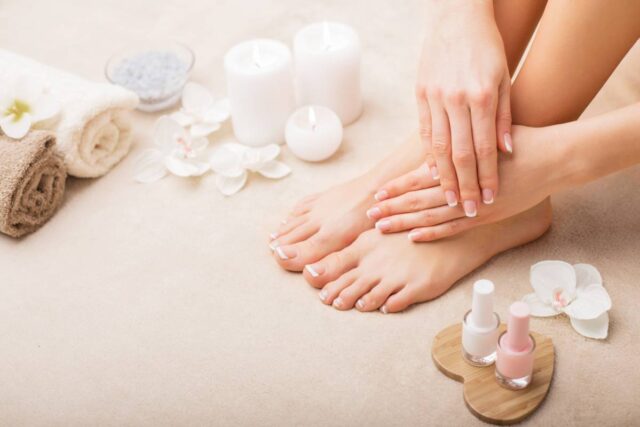Embrace the cold season with confidence! Dive into our guide on winter foot care, exploring essential tips, innovative footwear, and sock choices to keep your feet warm, dry, and healthy. Say goodbye to winter woes and hello to comfortable, happy feet.
Introduction
The arrival of winter brings a crisp chill in the air and a unique set of challenges for maintaining foot health. Cold and damp conditions can lead to a variety of foot problems, from dry skin and heel cracks to more severe conditions like frostbite and Raynaud’s phenomenon. Understanding these challenges and knowing how to address them effectively is key to keeping your feet in top condition throughout the season. This article will guide you through common winter foot ailments and introduce cutting-edge footwear and sock innovations designed to combat the cold, ensuring your feet stay warm, dry, and comfortable.
Table of Contents
Navigating Winter Foot Care Challenges

The chill of winter brings with it a unique set of challenges for foot health, primarily due to the cold and moist conditions prevalent during the season. Here’s a closer look at common winter foot ailments and how to combat them effectively.
Moisture Loss, Dryness, and Heel Cracks
Cause:
The dry air of winter can strip away the skin’s natural moisture, leading to dry, flaky skin and painful cracks, especially around the heels. These fissures can deepen, causing significant discomfort and sometimes bleeding.
Prevention:
- Regularly apply rich, oil-based moisturizers or ointments to your feet, particularly after showering.
- Use a humidifier to add moisture to your indoor air.
- Drink ample water to stay hydrated.
Treatment:
- Consistently use heavy moisturizers.
- For severe cracks, opt for heel balms with keratolytic elements like urea or salicylic acid to soften the skin.
- In extreme cases, seek a podiatrist’s help for specialized treatments, including prescription creams or devices to mend the cracks.
Chilblains (Pernio)
Cause:
Chilblains are the result of inflammation in the skin’s small blood vessels, triggered by cold, damp environments, leading to red, swollen, itchy, or painful patches.
Prevention:
- Ensure your feet remain warm and dry by wearing socks that wick away moisture and shoes that are insulated and waterproof.
- Avoid exposing cold feet to direct heat sources as sudden warming can worsen the condition.
Treatment:
- Slowly warm the affected areas.
- Apply topical corticosteroids to alleviate itching and swelling.
- Moisturize the affected skin regularly.
- For persistent issues, consult a healthcare provider for treatments like vasodilators.
Frostbite
Cause:
Frostbite happens when the skin and underlying tissues freeze, often affecting the toes, leading to numbness and changes in skin color to white, gray, or bluish, with the skin appearing hard or waxy.
Prevention:
- Ensure you wear insulated footwear and change wet shoes and socks promptly.
- Minimize exposure to freezing temperatures.
Treatment:
- Immediate medical intervention is crucial for frostbite.
- Warm the affected areas gently using warm water or body heat; avoid rubbing the area to prevent tissue damage.
- Prevent refreezing of thawed tissues to avoid severe damage.
Raynaud’s Phenomenon
Cause:
This condition causes numbness and coldness in certain body parts, like toes and fingers, in response to cold temperatures or stress, with affected areas turning white or blue.
Prevention:
- Dress warmly in layers and wear insulated footwear to keep your entire body warm.
- Employ relaxation techniques to manage stress effectively.
Treatment:
- Warming the body and reducing stress can help alleviate mild symptoms.
- For more severe instances, medications to enhance blood flow may be prescribed.
- Lifestyle changes, including quitting smoking and regular exercise, can aid in symptom management.
By understanding these common winter foot problems and implementing preventive and remedial measures, you can keep your feet healthy and comfortable throughout the cold season.
Elevating Winter Foot Care with Advanced Footwear and Socks

As the chill of winter sets in, the importance of selecting the right footwear and socks becomes paramount to fend off the cold and prevent foot-related issues. This guide delves into the cutting-edge options in winter footwear and socks, designed to keep your feet warm, dry, and healthy through the colder months.
Cutting-Edge Winter Footwear

Insulated Boots: Opt for boots equipped with modern insulation technologies like Thinsulate or PrimaLoft. These materials keep your feet warm without the bulk, ensuring comfort and breathability.
Water-Resistant Shoes: To combat wet conditions, choose shoes with waterproof barriers like Gore-Tex. These materials keep moisture out, ensuring your feet stay dry even in snow and slush.
Anti-Slip Footwear: With icy surfaces posing a risk of falls, shoes with anti-slip soles or traction technologies are essential. They provide improved grip and stability, reducing the risk of foot and ankle injuries.
Specialized Sock Innovations for Winter

Moisture-Wicking Socks: Select socks crafted from materials that wick away moisture. This feature is crucial for keeping feet dry, thereby lowering the risk of fungal infections.
Thermal Socks: Look for thermal socks made from wool or insulating fiber blends. These socks offer extra warmth but should also manage moisture to prevent overheating and sweat accumulation.
Compression Socks: Those experiencing swelling or symptoms of Raynaud’s phenomenon may benefit from compression socks. These socks enhance circulation and reduce discomfort, helping to ward off chilblains and other circulatory issues.
Smart Accessories for Footwear
Heated Insoles: For those spending considerable time outdoors, battery-operated heated insoles provide adjustable warmth, adding comfort and aiding in frostbite prevention.
Toe Warmers: Disposable toe warmers offer convenient, targeted warmth for outdoor activities. Adhesive versions stick to socks, focusing warmth on the toes for added comfort.
Importance of Proper Fit
No matter the advanced features, the right fit is crucial. Shoes that are too tight can impede circulation, while overly loose footwear may not offer sufficient warmth or support. Always try on winter shoes with the socks you intend to wear to guarantee a snug, effective fit.
Embrace Winter with Confidence in Foot Health
Integrating these innovative footwear and sock options into your winter attire can drastically improve foot health and comfort. Alongside the preventive measures and treatment strategies mentioned, these choices will help you enjoy the winter months with ease. For personalized advice, consider consulting a foot care specialist to tailor recommendations to your health needs and lifestyle.
Winter need not be a time of foot discomfort. With proactive care and the right gear, your feet can remain healthy and comfortable, letting you enjoy the beauty of the season worry-free. If you encounter persistent pain, severe cracks, signs of infection, or concerns about frostbite or Raynaud’s phenomenon, seeking professional medical advice is essential for proper care. Let this winter be a time of joy and comfort for your feet, supported by the best in care and technology.
| Arch Support |
| Arch Supports |
| Best Arch Support Insoles |
| Best Insole for Plantar Fasciitis |
| Insole for Flat Feet |
FAQ Section
Q: How can I prevent my feet from getting dry and cracked in the winter?
A: Regularly moisturize your feet with heavy creams, especially after showering. Use a humidifier to maintain indoor humidity and drink plenty of water to stay hydrated.
Q: What are chilblains, and how can I avoid them?
A: Chilblains are painful, itchy swellings on the skin caused by cold exposure. Prevent them by keeping your feet warm and dry, using moisture-wicking socks, and avoiding rapid heating of cold feet.
Q: How can I protect my feet from frostbite?
A: Wear insulated, waterproof footwear and change out of wet socks and shoes immediately. Limit exposure to extreme cold and gently warm any affected areas at the first sign of symptoms.
Q: What footwear features should I look for to combat winter conditions?
A: Opt for boots with modern insulation like Thinsulate, waterproof membranes like Gore-Tex, and anti-slip soles for enhanced grip on icy surfaces.
Q: Can specialized socks really make a difference in winter foot care?
A: Yes, moisture-wicking socks keep your feet dry, thermal socks provide additional warmth, and compression socks can improve circulation, all contributing to healthier winter feet.
Conclusion
Navigating the winter months without compromising foot health is entirely possible with the right knowledge and tools at your disposal. By understanding the common issues that arise during the cold season and implementing preventive and remedial measures, you can ensure your feet remain healthy and comfortable. Embrace the innovative footwear and sock options available today to provide your feet with the care and protection they deserve. Remember, if you experience persistent issues or severe symptoms, seeking professional medical advice is crucial. Let this winter be a season of joy and comfort for your feet, supported by the best in care and technology.



MOST COMMENTED
Animal-Based Proteins / Casein Protein / Dietary Protein / High-Protein Diets / Pea Protein / Plant-Based Proteins / Protein / Protein Deficiency / Protein Supplements / Proteins / Whey Protein / Whey Proteins
Is Protein Powder Safe for Teenagers and Children?
Animal-Based Proteins / Casein Protein / Dietary Protein / High-Protein Diets / Pea Protein / Plant-Based Proteins / Protein / Protein Deficiency / Protein Supplements / Proteins / Whey Protein / Whey Proteins
Unlock the Power of Proteins for Optimal Gut Health
Multivitamin
Total Health: Multivitamin for Active Lifestyles
Multivitamin
WellnessFusion: Complete Multivitamin Support
Dietary Supplement
Revitalize Your Health: The Magic of Red Yeast Rice Capsules
Foot care / Foot Health
Revitalize Your Foot Care Routine: Essential Tips for Optimal Foot Health
Foot Problem / Diabetics / Foot Health
Diabetics: Mastering Footwear Selection for Enhanced Foot Health and Ultimate Comfort
Exercises and Footwear Tips for Hammertoe Relief / Foot care / Foot Health / Foot Pain / Foot Problem / Hammertoes
Unlock Effective Exercises and Footwear Tips for Hammertoe Relief
Hammertoes / Foot Health / Foot Pain / Foot Problem
Unlock Relief: Essential Guide to Hammertoes Causes, Symptoms, and Treatments
Foot Problem / Foot Health
Revolutionize Your Recovery: Natural Remedies for Plantar Fasciitis – Fresh Home Keepers